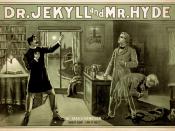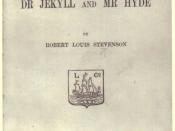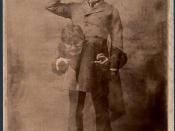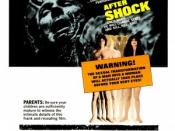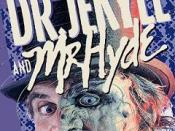The story begins with a prominent London lawyer, Mr. Utterson, and his distant kinsman, Mr. Enfield, taking their usual Sunday stroll. On this day, they pass a house with a door that is very different from those around it. The sight of this door sends a cold shiver down the spine of Mr. Enfield, for he witnessed a brutal scene here some time ago. He watched as an unpleasant man trampled upon a small girl while in a hurry to get somewhere. The girl started screaming and this drew a crowd to the scene. The name of this man was Mr. Edward Hyde. The crowd forced him to make retribution in the form of money, so he vanished into the door. When he returned, he had a check for 90 pounds signed in the name of Dr. Henry Jekyll. This check, to the crowd?s amazement was valid. Throughout the book, Mr.
Hyde is described as ?something displeasing, something downright detestable.? Mr. Utterson had further reason to be interested in Mr. Hyde. Dr. Jekyll?s will was very unusual. It stated that Mr. Hyde would be the sole beneficiary of all wealth and property in case of ?disappearance or unexplained absence.? This baffled Mr. Utterson. At a dinner party, Mr. Utterson asks Dr. Jekyll why he drew up the will like this. Jekyll did not want to talk about it. All he asked for was his wishes be granted. About a year after this, a maid witnessed the murder of Sir Danvers Carew, Member of Parliament. The murderer escaped before he could be apprehended. However, the maid was able to positively identify the murderer as Mr. Hyde. The police, along with Mr. Utterson, go to Hyde?s apartment only to find him absent. Dr. Jekyll was questioned on his whereabouts. Jekyll shows them a letter written by Mr. Hyde stating that he would be gone forever. At this time, Dr. Jekyll also says that he is completely through with Mr. Hyde. During another Sunday stroll, Mr. Utterson and Mr. Enfield notice Dr. Jekyll through a window of his apartment. They ask him if he would like to join them, but suddenly Jekyll?s face is filled with terror, and a grimace of horrible pain. At this moment, the window is closed and Dr. Jekyll had disappeared. Both men are horrified at this scene. Some time later, Mr. Utterson receives a visit from Poole, Dr. Jekyll?s servant. Poole suspects that there has been foul play having to do with his employer, Dr. Jekyll. He stated that Jekyll had confined himself to his laboratory for over a week, had ordered all of his meals to be sent in, and has sent Poole on frantic searches to various chemists for a mysterious drug. Poole is convinced that Dr. Jekyll has been murdered and that the murderer is still hiding in the laboratory. Hearing all this, Mr. Utterson goes to the apartment with Poole. After breaking into the laboratory, they discover the figure had just committed suicide by drinking a vial of poison. Both men search the building for Dr. Jekyll and find nothing but a note addressed to Utterson. The note informs Mr. Utterson to go home and first, read the letter from Dr. Lanyon, and then the enclosed document entitled, ?Confession.? The narrative of Dr. Lanyon reveals that Dr. Jekyll had written to him, and had requested him to follow these precise instructions: go to Jekyll?s laboratory, secure certain items, bring them back to his house, and at midnight, a person whom Lanyon would not recognize would come to his house to obtain these items. Dr. Lanyon writes that he followed these instructions to the tee, and at midnight a man appeared at his house requesting the items. Before the man left he asked for a ?graduated glass?, and he proceeded to mix the powders and liquids together. After careful mixing, the man drank the potion. To Dr. Lanyon?s horror, the man transformed into Dr. Jekyll right before his eyes! Lanyon closed his letter by saying that the man who had come to his house to obtain these items, was the man known as Mr. Hyde.
The book Dr. Jekyll and Mr. Hyde reminded me of the section we did in Humanities on Heaven and Hell and Good vs. Evil. Dr. Jekyll was a law-abiding citizen in his town. He had a good heart and was a wholesome, hardworking man. Mr. Hyde, on the other hand, was truly evil. He was able to commit violent acts, such as murder, and feel no shame for his actions. Heaven is known as a good place with no violence. Hell is known for torture and pain. The final chapter of this book explains in detail the basis for Dr. Jekyll?s experimentations. In short, Dr. Jekyll had been raised wealthy. He grew up handsome, honorable, and distinguished, yet he committed secret acts that he always felt ashamed of. For these reasons, he became obsessed with the idea that he had dual identities. His scientific knowledge led him to contemplate the possibility of scientifically isolating these two separate components. Having compounded a certain mixture, he then drank it, and his body, under great pain, was transformed into an ugly ?being.? This ?being? represented pure evil. Drinking the same potion again, transformed him back to his original good self.
I feel that this is probably one of the best books I have ever read. It was very well written and had a very mysterious plot. I really enjoyed the conflict between good and evil. This plot made it very interesting to read. One weakness that I noticed was that the characters were not described in detail. The author left a lot up to the readers? imagination. This is not my favorite type of writing style. Other than that minor detail, the book was great! I would recommend this book to anyone who likes mystery. Everyone I know that has read this book has enjoyed it very much.
